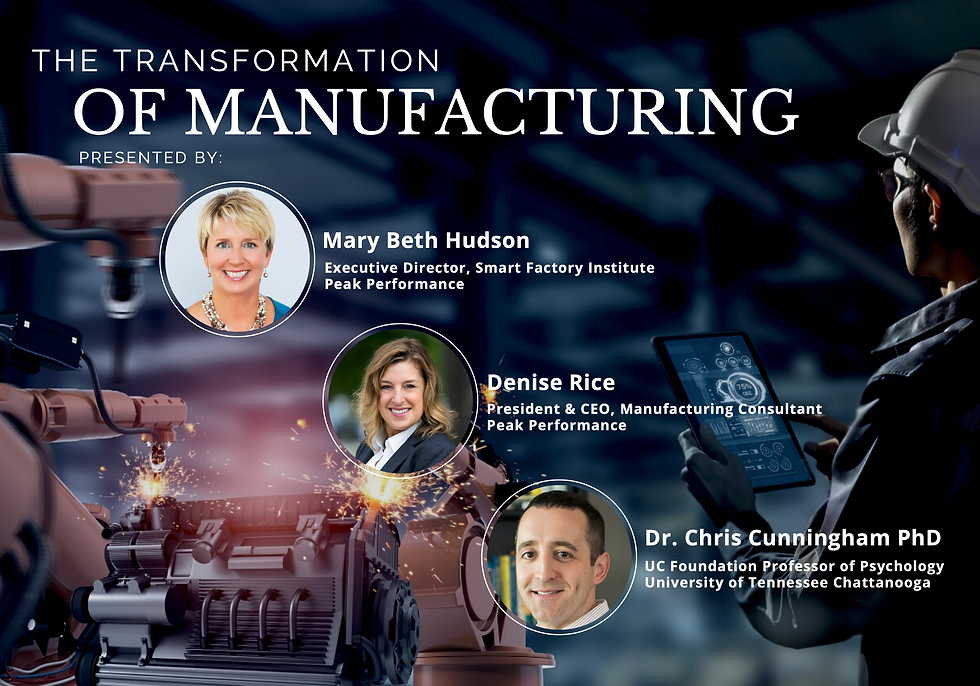The Transformation of Manufacturing: Advanced Manufacturing Technologies
- Peak Performance

- Feb 8, 2022
- 3 min read
This article is based on the findings in the report, Understanding the Impacts of Industry 4.0 on Manufacturing Organizations and Workers, prepared for the Smart Factory Institute and written by Chris Cunningham, PhD, UC Foundation Professor of Psychology, and Scott Meyers, Graduate Assistant, Psychology Department & Smart Factory Institute, from the Industrial and Organizational Psychology Department at the University of Tennessee at Chattanooga.
In general, Industry 4.0 involves work being done in a digitally interconnected and technology-intensive environment where constant real-time data exchanges take place (Hernandez-de-Menendez et al., 2020). Essentially, all technological components of manufacturing production systems have the potential to be transformed or otherwise enhanced due to the digitalization that is at the heart of Industry 4.0 (Statista, 2021). Ultimately, the development and implementation of advanced manufacturing technology leads to improved decision making, better monitoring of production, more efficient use of resources, and more accurate forecasting of demands (Hernandez-de-Menendez et al., 2020). Interconnected systems and vast data sets lead to faster and better-quality decisions and flexibility.
Industry 4.0 has introduced and integrated a variety of technology developments into manufacturing processes. Major developments along these lines include the technologies represented at a high-level in Figure 2 and summarized in more detail in Table 2 (Statista, 2021). In a fairly recent industry profile report, some of the highest levels of technology adoptions included ML (87%), big data analytics (84%), the IoT (82%), cloud computing (76%), web-based application utilization (76%), augmented and virtual reality tools (71%), wearable electronics (61%), and 3D printing (61%) (World Economic Forum [WEF], 2021). Additionally, in a Deloitte survey of 500 global senior manufacturing executives, advanced manufacturing techniques were ranked by future importance (Deloitte, 2021; Statista, 2021). In this ranking, predictive analytics, IoT with smart/connected products, advanced materials, digital design/simulation/integration, computing, advanced robotics, and additive manufacturing were all highly ranked by these subject matter experts in the U.S., China, and Europe (Deloitte, 2021; Statista, 2021). It is important to note, however, that although leaders of manufacturing organizations may be increasingly ready to adopt Industry 4.0 technologies, the same is not necessarily true within the broader workforce in which there continues to be concern and lack of understanding about the impacts of these technologies on the actual manufacturing workers. We examine these impacts later in this report.


Join us LIVE as we explore the current manufacturing industry and the challenges and opportunities it faces in the midst of the adoption of Industry 4.0. The Transformation of Manufacturing, 3-stop tour across the state of Tennessee, will continue this week with its second stop in Chattanooga and will conclude next week in Smyrna, TN. Each session builds on the prior session. In-person and virtual attendance options are available. Join us in person at your local session and virtually for the other two sessions!
Session 2: Industry 4.0 Impact on the Worker
February 9, 2022 | 7:30am - 8:30am (CT)/8:30 - 9:30am (ET)
Location: LIVE from the Smart Factory Institute, Chattanooga, TN
Virtual Attendance Only
Session 3: Achieving Industry 4.0 Organizational Success
February 16, 2022 | 7:30am - 8:30am (CT)/8:30 - 9:30am (ET)
Location: TCAT Smyrna/Nissan Training Center, 663 Ken Pilkerton Dr., Smyrna, TN 37167
In-Person & Virtual Attendance Options Available
Sessions are free to attend, registration is required.
This tour is based on the findings in the report, Understanding the Impacts of Industry 4.0 on Manufacturing Organizations and Workers, prepared for the Smart Factory Institute and written by Chris Cunningham, PhD and Scott Meyers from the Industrial and Organizational Psychology Department at the University of Tennessee at Chattanooga. Get access to this full report by clicking here.

Comments